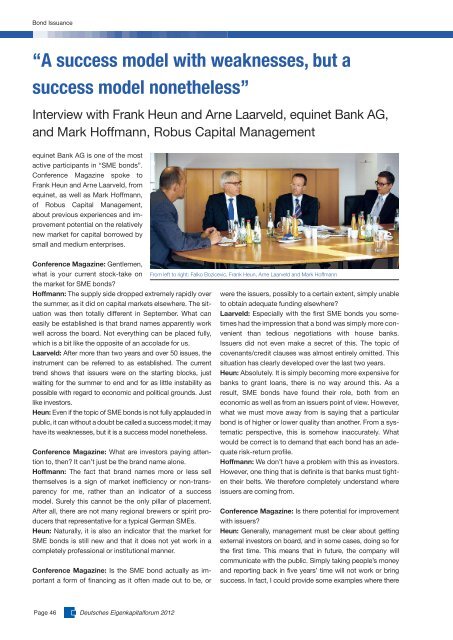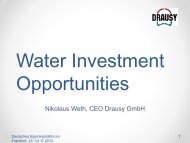Conference Magazine - GoingPublic.de - Deutsches Eigenkapitalforum
Conference Magazine - GoingPublic.de - Deutsches Eigenkapitalforum
Conference Magazine - GoingPublic.de - Deutsches Eigenkapitalforum
Create successful ePaper yourself
Turn your PDF publications into a flip-book with our unique Google optimized e-Paper software.
Bond Issuance<br />
“A success mo<strong>de</strong>l with weaknesses, but a<br />
success mo<strong>de</strong>l nonetheless”<br />
Interview with Frank Heun and Arne Laarveld, equinet Bank AG,<br />
and Mark Hoffmann, Robus Capital Management<br />
equinet Bank AG is one of the most<br />
active participants in “SME bonds”.<br />
<strong>Conference</strong> <strong>Magazine</strong> spoke to<br />
Frank Heun and Arne Laarveld, from<br />
equinet, as well as Mark Hoffmann,<br />
of Robus Capital Management,<br />
about previous experiences and improvement<br />
potential on the relatively<br />
new market for capital borrowed by<br />
small and medium enterprises.<br />
<strong>Conference</strong> <strong>Magazine</strong>: Gentlemen,<br />
what is your current stock-take on<br />
the market for SME bonds?<br />
Hoffmann: The supply si<strong>de</strong> dropped extremely rapidly over<br />
the summer, as it did on capital markets elsewhere. The situation<br />
was then totally different in September. What can<br />
easily be established is that brand names apparently work<br />
well across the board. Not everything can be placed fully,<br />
which is a bit like the opposite of an accola<strong>de</strong> for us.<br />
Laarveld: After more than two years and over 50 issues, the<br />
instrument can be referred to as established. The current<br />
trend shows that issuers were on the starting blocks, just<br />
waiting for the summer to end and for as little instability as<br />
possible with regard to economic and political grounds. Just<br />
like investors.<br />
Heun: Even if the topic of SME bonds is not fully applau<strong>de</strong>d in<br />
public, it can without a doubt be called a success mo<strong>de</strong>l; it may<br />
have its weaknesses, but it is a success mo<strong>de</strong>l nonetheless.<br />
<strong>Conference</strong> <strong>Magazine</strong>: What are investors paying attention<br />
to, then? It can’t just be the brand name alone.<br />
Hoffmann: The fact that brand names more or less sell<br />
themselves is a sign of market inefficiency or non-transparency<br />
for me, rather than an indicator of a success<br />
mo<strong>de</strong>l. Surely this cannot be the only pillar of placement.<br />
After all, there are not many regional brewers or spirit producers<br />
that representative for a typical German SMEs.<br />
Heun: Naturally, it is also an indicator that the market for<br />
SME bonds is still new and that it does not yet work in a<br />
completely professional or institutional manner.<br />
<strong>Conference</strong> <strong>Magazine</strong>: Is the SME bond actually as im -<br />
portant a form of financing as it often ma<strong>de</strong> out to be, or<br />
Page 46 <strong>Deutsches</strong> <strong>Eigenkapitalforum</strong> 2012<br />
From left to right: Falko Bozicevic, Frank Heun, Arne Laarveld and Mark Hoffmann<br />
were the issuers, possibly to a certain extent, simply unable<br />
to obtain a<strong>de</strong>quate funding elsewhere?<br />
Laarveld: Especially with the first SME bonds you sometimes<br />
had the impression that a bond was simply more convenient<br />
than tedious negotiations with house banks.<br />
Issuers did not even make a secret of this. The topic of<br />
covenants/credit clauses was almost entirely omitted. This<br />
situation has clearly <strong>de</strong>veloped over the last two years.<br />
Heun: Absolutely. It is simply becoming more expensive for<br />
banks to grant loans, there is no way around this. As a<br />
result, SME bonds have found their role, both from en<br />
economic as well as from an issuers point of view. However,<br />
what we must move away from is saying that a particular<br />
bond is of higher or lower quality than another. From a systematic<br />
perspective, this is somehow inaccurately. What<br />
would be correct is to <strong>de</strong>mand that each bond has an a<strong>de</strong>quate<br />
risk-return profile.<br />
Hoffmann: We don’t have a problem with this as investors.<br />
However, one thing that is <strong>de</strong>finite is that banks must tighten<br />
their belts. We therefore completely un<strong>de</strong>rstand where<br />
issuers are coming from.<br />
<strong>Conference</strong> <strong>Magazine</strong>: Is there potential for improvement<br />
with issuers?<br />
Heun: Generally, management must be clear about getting<br />
external investors on board, and in some cases, doing so for<br />
the first time. This means that in future, the company will<br />
communicate with the public. Simply taking people’s money<br />
and reporting back in five years’ time will not work or bring<br />
success. In fact, I could provi<strong>de</strong> some examples where there
















